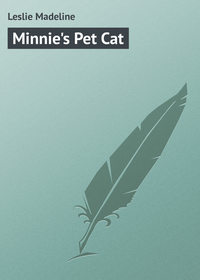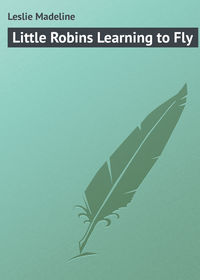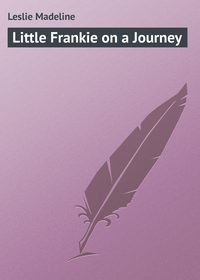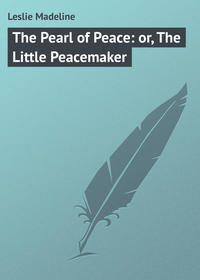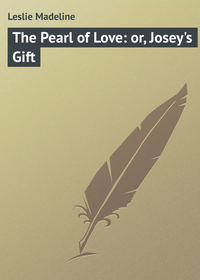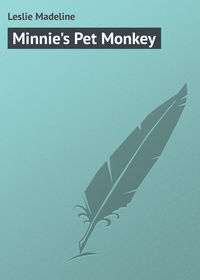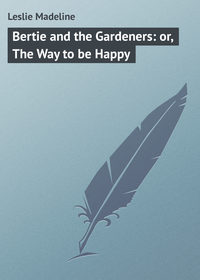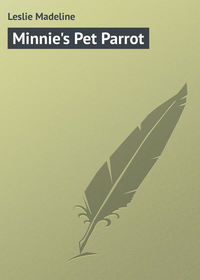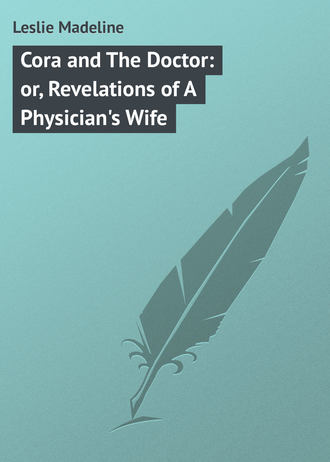 полная версия
полная версияCora and The Doctor: or, Revelations of A Physician's Wife
Mr. Curtiss, under excitement, interrupted the witness, saying, "you need not repeat the testimony of other witnesses."
Cross-examination by Mr. Marshall. "Did he tell you why he wished to see the Doctor?"
"He said, he had something of great importance to confess to him, and he could not die with it upon his conscience."
"How did he appear when you returned with the Doctor?"
"Perfectly calm and rational."
"Who were then present?"
"Dr. Lenox, Mrs. Fuller, Mrs. Andrews, and myself."
"Relate what occurred."
"The Doctor went directly to the bed. When Mr. Fuller saw him, he said audibly, 'thank God!' He then added, that he had committed a great crime which he wished to confess before he died, and that it related to the last will of the late Joseph Lee. Dr. Lenox immediately requested me to go for the nearest magistrate. When I returned with Justice Wilson, the Doctor was praying with the sick man. Fuller's wife holding her husband and weeping, stood the other side of the bed with Mrs. Andrews. Prayer being closed, the Doctor informed Justice Wilson of the wish of Hugh Fuller to make a confession which it was important to take in a legal form. The Justice then took the sick man's confession in our presence in the form of an affidavit."
Mr. Balch was next called, and as he took the stand Mr. Willard, with a hasty and agitated step, returned to the court room and resumed his seat. Every eye was turned toward him, as he appeared to be under great excitement which he in vain endeavored to conceal. He hastily whispered to Mr. Marshall, who started in surprise, and seemed fully to participate in his feelings.
Mr. Curtiss to Mr. Balch. "Were you acquainted with Mr. Fuller?"
"Intimately; I lived next door to him, and we frequently worked together. I saw him almost daily before his death."
"Did you see him often during his sickness?"
"I was at his house every day to inquire after him, and I watched with him several nights."
"Did you discover signs of insanity in him?"
"I did."
"Relate to the court what you recollect of them."
"He frequently talked with me about business that he had no connection with, and about all sorts of things that he never talked about in health."
"When did you see him last?"
"On the day before his death."
"How did he then appear?"
"He was as wild as a hawk, and kept trying to get off the bed, and pulling the clothes."
"What did he talk about?"
"He spoke of houses, and farms, and cattle, and workmen, and all sorts of things, and run from one to another without any connection."
Here Mr. Curtis rose with an air of triumph and exultation and said, "Your Honor, unless the counsel for the prosecution wish to cross-examine this witness, we shall here close the direct testimony for the defence."
Mr. Willard, who had been sitting during the examination of the last witness, with his face concealed by a book, now rose and said, "Your Honor, and you, Gentlemen of the Jury, we shall waive the privilege of cross-examining the last witness for the defence, that we may hasten to introduce a few items of rebutting testimony at this stage of the trial."
This was said in so low a voice as scarcely to be heard, while he actually trembled with the effort to suppress his emotions. "For this purpose," he continued, "I recall Mrs. Martha Fuller."
Mr. Curtiss objects. "She has been already on the stand."
Mr. Willard. "Your Honor, I recall her to elicit new testimony, not known at that time."
Mrs. Fuller having presented herself, he asked leave of the court to inquire, if any one here present were acquainted with the hand writing of Oscar Colby, of Edward Stone, of Hugh Fuller, or of the late Joseph Lee.
Many voices responded to the call; a number of persons came forward, and having taken the oath, Mr. Willard advanced toward them, and slowly drawing out his large pocket-book, proceeded to take from thence two yellow and time-worn documents. He partially unfolded them, when each of the signatures were identified, with the exception of that of Edward Stone.
While this was going on the prisoners started suddenly from their seats, lawyers and reporters dropped their pens in their eagerness to witness what was to follow; even the counsellors for the defence seemed to hang in breathless suspense upon the issue of the moment.
Then unfolding the larger document, he said, "May it please your Honor, and you, Gentlemen of the Jury: The names of Oscar Colby, Edward Stone, and Hugh Fuller, here appear as witnesses to the last will and testament of the late Joseph Lee, bearing his characteristic signature, and seal, drawn up in the hand-writing of the said Oscar Colby, and bearing even date with the deed before referred to, to wit: – Crawford, October twenty-third, one thousand eight hundred and thirty-seven."
Here Joseph Lee in a frenzy of rage attempted to spring over his own box into that of his companion, and screamed out, as he met the iron railing, "Perjured wretch, you swore to me it was destroyed."
The sheriff rapped and thundered "order in court." Still he raved and swore like a maniac, and the sheriff could not control him.
Though he was heavily ironed, it required the full strength of several constables to keep him quiet.
Order being restored, Mr. Willard said, "I will here introduce two items of written testimony to rebut the charge of insanity against the author of the affidavit, the principal witness for the prosecution, and to confirm other testimony for the government already before the court. It was not known that these items existed, when we concluded the presentation of the case in behalf of the Commonwealth. I put in as written testimony, first, the last will and testament of Joseph Lee, deceased, which is as follows:
"'In the name of God, Amen. I, Joseph Lee Senior, of Crawford, in the County of – , Commonwealth of Massachusetts, gentleman, being on my sick bed, and in the near prospect of death, but of sound and disposing mind and memory, do make and publish this my last will and testament, hereby revoking a former will made by me, and signed and sealed on the fifth day of August, one thousand eight hundred and thirty-five.
First. I hereby constitute and appoint my beloved son-in-law, Allen Mansfield, to be sole executor of this my last will, directing him to pay all my just debts and funeral charges out of my personal estate, as soon after my decease, as shall by him be found convenient.
Second. I give and bequeath to my beloved daughter, Lucy Lee Mansfield, all the real estate of which I may die possessed.
Third. I give and bequeath to my faithful steward, Jacob Strong, and to my faithful house-keeper, Susan Burns, each the sum of one thousand dollars.
Fourth. I also give and bequeath to each of my faithful servants, Samuel Dane, Sarah Brown, and Maria Keys, the sum of five hundred dollars.
Fifth. I give and bequeath the sum of ten thousand dollars as a fund to the Pastor, Rev. Asa Munroe, and Deacon Simon Crocker, and Deacon Josiah Hanscomb, of the first Congregational church in this place, to be held in trust by them and their successors in office forever, subject to the advice of said church. The annual income thereof is to be by them expended for the relief of the poor, and for objects of charity; a preference being always given among the poor to those impoverished by intemperance; and among objects of charity to those more immediately under their observation.
Sixth. I give and bequeath all the residue of my personal property to my son-in-law, Allen Mansfield, Frank Lenox and John Marshall, and their successors whom they shall appoint, to be by them held in trust, and at their discretion used for the support, and personal comfort of my son, Joseph Lee, and to his heirs after him; or in the event of his death without legitimate offspring, the same shall after his decease revert to my daughter Lucy Lee Mansfield, her heirs and assigns forever.
In testimony whereof, I, the said Joseph Lee, have to this my last will and testament, set my hand and seal, this twenty-third day of October, in the year of our Lord one thousand eight hundred and thirty-seven.
Joseph Lee. [L. S.]Signed, sealed, published, and declared by the said Joseph Lee, as and for his last will and testament, in the presence of us, who at his request, and in his presence, and in the presence of each other, have subscribed our names as witnesses hereto.
Oscar Colby,Edward Stone,Hugh Fuller.'"After he had carefully folded the tattered document and replaced it in his pocket-book, Mr. Willard read the other item of documentary testimony, which proved to be this note of hand.
"For value received, I promise to pay Oscar Colby or order, five thousand dollars annually, on the first day of January, in each year, during the term of his natural life.
Signed, Joseph Lee."Crawford, November 23, 1837.
On the back of this note were seven annual endorsements of five thousand dollars each; amounting to thirty-five thousand dollars.
Turning to the Judge, he then said, "May it please your Honor, and you, Gentlemen of the Jury, I am instructed by my colleague, the Attorney General, to submit the case in behalf of the Government without argument or comment. This we do from a conviction that after such disclosures, and this array of testimony, a closing argument would be not only a superfluity, but almost an insult to your understanding."
When he had resumed his seat, Mr. Burke for the defence arose, and said, "May it please your Honor, and you Gentlemen of the Jury, no persons can be taken by greater surprise at these remarkable disclosures, than the counsellors for the defence. And cordially concurring in the remarks of the learned counsel for the prosecution, we have concluded to follow his worthy example, and submit the case without argument, merely invoking for our clients as large a share of commiseration, as may consist with your sense of justice, and with the laws pertaining to their cause."
The Judge arose from the Bench, and in slow, and grave accents, commended the counsellors, both for the prosecution and the defence for the brief and direct manner in which they had mutually yielded the case to the court. "The same considerations," he added, "which have in their judgment superseded all demand for a closing argument, lead me, Gentlemen of the Jury, to feel that there can be no occasion for my giving you a prolonged charge. The nature of the crime for which the prisoners are arraigned and the penalties which it incurs, have been so properly and ably expounded to you by the counsellors as to supersede the necessity of additional comment thereon by the Bench. The trial has been protracted, and your minds must have been perplexed with doubts respecting the importance to be attached to the confession of Hugh Fuller until the introduction of the documentary testimony just submitted, which pours a flood of light upon the case, which of itself would seem sufficient to establish their guilt, and which, taken as a corroboration of the direct and circumstantial testimony previously before the court, amounts to an array of evidence seldom presented. If this evidence has convinced your judgment of the guilt of the prisoners, you will render your verdict accordingly."
The Jury retired, and after a few moments returned. The foreman arose and said, "We have made up our verdict."
By order of the court Joseph Lee was remanded to the prisoner's box to hear the verdict.
Clerk. "Do you find the prisoners guilty, or not guilty?"
Reply. "Guilty."
Judge. "The Court will postpone the proclamation of the sentence until the morning session."
The Court then adjourned till Thursday morning at nine o'clock, it being already past two o'clock, P. M.
Thursday Morning, November 7th. The court met pursuant to adjournment. At nine o'clock the sheriff and his attendants came into the Court, but without the prisoners. Great excitement was manifested. He communicated with the Judge, who exhibited strong emotion, and who, when the sheriff had opened the Court, announced the death by suicide of Joseph Lee, and the dangerous illness of Oscar Colby.
Monday, November 11th.So ended this horrible tragedy. I intended to have taken notes, but my all-absorbing interest in the trial prevented me. Indeed I forgot even my intention to do so. The night of Tuesday, I could not close my eyes in sleep; but lived over and over again the exciting scenes of the day, while the loathsome, purple face of Joseph and the haggard visage of his companion were ever before me.
My dear Lucy was seriously indisposed when we called for her, on our way to the trial, and was glad to remain at home. Allen too bore the marks of the excitement and suffering of the day before, and said he would not willingly go through another such day for all the property in Crawford. But he was destined to a far greater trial during the day on which he had entered.
I have copied from the daily papers a full account of the trial, merely adding to it from my own memory. But now I shall endeavor to explain some circumstances connected with it which have not yet been made public. You will remember that in the report of Wednesday morning, Mr. Willard abruptly left the court-room, after requesting Mr. Marshall to cross-examine the witnesses. The following statement he made to Allen Mansfield, the Doctor, myself and some others after the trial. I will relate it nearly in his own words.
"It would hardly be supposed," he said, "that I could sleep much at that stage of this exciting trial. I tossed from side to side during the night, and as I reviewed the testimony, came almost to the conclusion that the counsel for the defence would destroy the affidavit in the minds of the Jury and get the case. I thought, if I could only find the second will or some clue to it, this would relieve my embarrassment. I became so much excited by the new train of thought, that I arose from my bed, dressed, and commenced a vigorous walk across my room.
"Plan after plan for obtaining it or some trace of it was thought of and rejected. Morning dawned; and the duties of the day left me no time for farther speculation. But my midnight thoughts prepared me for what followed, and when I went into Court, a light dawned upon me. It was connected with a circumstance with which you are already acquainted; namely, with the anxiety which Colby had manifested to have his clothes brought to him in the jail.
"During the examination of one of the first witnesses, it suddenly occurred to me to inquire of the jailer whether he had ever mentioned any garment in particular. I left the court-room for that purpose, and was soon at the jail. I began cautiously by asking whether the prisoners had been rendered comfortable during their confinement. To this, the jailer replied, 'far more comfortable than they deserved. They are ungrateful rascals. Notwithstanding the pains I have taken with Joseph's meals, in consequence of the wishes of his brother Mansfield, yet he was always cursing and swearing in the most shocking manner.'"
"And how was it with Colby? I asked.
"I can't say that he did precisely the same. I've nothing to say against him except that he was always complaining of cold and sending for more clothes. I have sent twice, and I told him that I wouldn't be bothered with sending again; so I gave him a shawl to put over him.'
"Did he ever mention any particular garment which he wished?"
"'Yes indeed. It's vests he asks for. The first time, the man forgot about the vest, and brought an overcoat or something of that sort; but the next time he got one.'
"Well," said I, trembling with a mere suspicion that I had got a clue that might lead to the discovery. The jailer seeing me much interested, went on.
"'The very next day, he wanted another vest; and I refused downright to send again.'
"Did he specify any one in particular?"
"'Yes; he said he wanted a new checked satin one, hanging in his wardrobe.'
"I had heard enough; and bidding the jailer good morning, I stopped at the court-room only long enough to take a sheriff, and proceeded to Lee Hall. Without imparting my suspicions to my companion or to the keeper of the house, I merely told them that I wished once more to examine the room occupied by Mr. Colby; and notwithstanding the doubt of finding anything new, expressed by the keeper, I walked straight to the wardrobe, and took down every vest hanging there.
"After laying them upon the bed, I proceeded, (not very deliberately, I confess) to examine the pockets and to see if I could discover any inner pockets. But no, the keeper standing by said, as I laid one down after another, 'them are clothes has all undergone a thorough castigation, and there ha'n't nothing been found in 'em.'
"Hardly knowing why, I took up again the thick black satin vest, and walked to the window. My heart almost stopped beating, as I saw that a slit had been cut in the lining, and carefully sewed up again. Quick as lightning, I cut the thread, put in my fingers, drew out the very document of which I was in search, and the note of hand within it. I sprang full two feet from the floor, as I discovered the treasure, and my companions echoed and reechoed my shout of delight. I hastened to the court-room with my important rebutting testimony," said he with a smile, "and you know the result."
Allen Mansfield was so excited during this relation that he had to sit down two or three times, and then forgetting himself he started from his seat. When Mr. Willard had finished his remarkable story, he found that his circle of hearers had greatly increased since the commencement of his narrative. Not only Mr. Marshall, the Attorney General, the Counsellors for the defence, and a score of Reporters but the Judge from the bench had pressed around him to learn how so important a mystery had been revealed. He then received the warm congratulations of all his associates at the bar, for his success, and at the favorable termination of the suit.
Mr. Mansfield begged the Doctor and myself to communicate the result of the trial to Lucy. We did so, but found her suffering so severely from nervous excitement, that my husband judged it wiser to avoid particulars, and merely to inform her that the suit had resulted in her favor. A deep sigh, with the words, "Oh! my poor brother Joseph!" were all her reply.
It was now past three o'clock, and I hastened to my babies, and communicated the sad story to mother. In consequence of losing my sleep the previous night, I did not rise till quite late on Thursday morning. When I went below, a man was just leaving the hall; and as Frank shut the door after him, I heard him say, "Oh! how shocking!" He immediately prepared to go out.
"My dear husband," I said, "something dreadful has happened, I perceive by your looks. Don't be afraid to tell me. I fear Lucy" —
"No! No!!" said he, interrupting me, "I have heard nothing from her. Don't be alarmed. I shall soon be back."
He had been gone nearly an hour, when a messenger came in great haste for him to go to Mr. Mansfield's – Lucy was in a dreadful swoon. I ran down to inquire more particularly, and to direct him to go to the office for the Doctor, when he told me the horrid catastrophe. Joseph Lee had been found dead in his cell, having hung himself from a large hook driven into the wall and used to hang up a coat or a hat.
With mother's advice, I proceeded immediately to Mr. Mansfield's, where I found every thing in the utmost confusion. Servants were running to and fro; some crying, some trying to soothe others, while Emily and her sweet little brothers were the only ones who remained calm. I stopped a moment to speak to them in the nursery, when the dear girl said, "I'm trying to keep my brothers quiet, because mamma is very sick."
I hastened to their mother's chamber, where my husband was leaning over his patient, applying the most powerful restoratives, while her agitated husband and Mrs. Burns were putting stimulants to her hands and feet. Not a pulse throbbed – no sign of life appeared. The Doctor repeatedly held a small mirror before her face, but was unable to discover the least breath. But at length, with a deep sigh from her over-burdened heart, she very gradually recovered her consciousness.
All stood back from her view except her physician. Poor Allen, with tears streaming down his cheeks, dared not show himself. The sufferer was soon able to take a little camphor and water, and without letting her see me, I returned to the children. Summoning the nurse, I told her if she would dress her young charge, I would send for them to pass the day with my little ones; and not waiting for my husband, I returned home.
That was on Thursday morning, the time appointed by the Judge, for the prisoners to receive their sentence. When the jailer went to carry them their breakfast, he ascertained that one of them was beyond the reach of any earthly tribunal. He had rushed unbidden, into the presence of his great Judge. Hastening to the other cell, and almost fearing to enter, lest he should find him in a similar condition, he ascertained that he was raving incoherently from a fever, and hastily sent for the Doctor. His disease proved to be a violent congestion of the brain; and it still remains very doubtful whether he will recover.
A coroner's jury was called to sit on the body of Joseph, and rendered a verdict of death by suicide. The Doctor says he cannot see how he could have succeeded in his attempt. He had hooked his cloak around his neck, and then hung it upon the hook on the wall by one of the eyes which fastened it together. He had been dead some hours, and probably terminated his life soon after dark, though from the examination it appeared that he must have been a long time in the agonies of death. His face was almost black, and his hands tightly clenched. So died Joseph Lee! The vast wealth of which he had so unrighteously possessed himself, what now was that to him? It would only fill his soul with enduring agony and remorse.
Friday, November 22d.Emily Lenox Mansfield, with her twin brothers Charlie and Harry, have this morning left us to go home. I feel quite lonely without them. Emily is a most engaging child of six years of age. Her eyes filled with tears as she parted with Pauline, who has been extremely kind and obliging to her little visitors. I promised that she should soon spend a day with them, now that their mother is getting stronger. Mrs. Mansfield was very ill for several days after hearing of her brother's dreadful end. She recovered from one fainting fit only to fall into another. I think Frank became really alarmed at last; but she is now much better, and able to sit up two or three hours in a day.
She has never asked a question about the result of the trial, and is still unacquainted with the shocking detail. The Doctor fearing lest she should hear of it suddenly, told her yesterday of the death of Oscar Colby, which occurred night before last. My husband has visited him twice every day in his cell, hoping to find an opportunity, if his reason should return, to point him to his crucified Saviour. But alas! no such season presented itself. The poor man never appeared to be conscious, not even for a moment, after he was found so ill the day after the trial.
One fact will interest you much. The distillery is closed for ever. Mr. Mansfield intends to convert it into a large warehouse.
Lee Hall is undergoing repairs, and early in the spring, I suppose we shall lose our loved neighbors, who will go to the old homestead. Jacob Strong and Sarah Brown will go back with them. Mrs. Burns and Maria Keyes have always remained in the family. I believe I express the feelings of the whole community when I say, that I am delighted that such persons as Mr. and Mrs. Mansfield have come into the possession of so valuable an estate. I know, they feel themselves to be but stewards, and that they will hereafter be called to render an account of their stewardship.
CHAPTER XXXII
"All is not here of our belov'd and blessed, —Leave ye the sleeper with his God to rest!" Mrs. Hemans.Wednesday, October 15th, 1845.My dearly loved mother, – How can I express words of sympathy to you, when my heart is so full of grief on my own account, from such a loss as I can never experience but once, the loss of a father.


